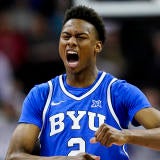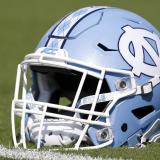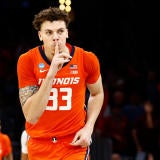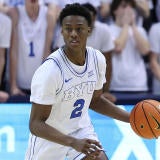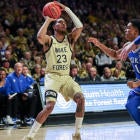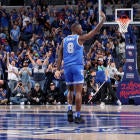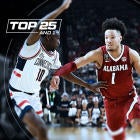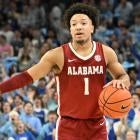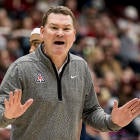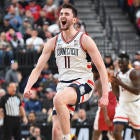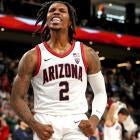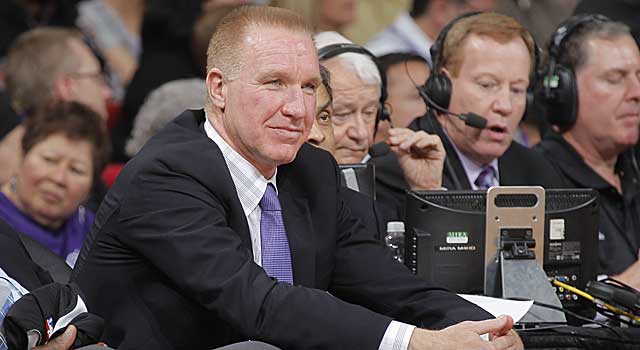
After spending three decades on the West Coast, Chris Mullin has come home. The former NBA star is the new coach at St. John's and hopes to return his alma mater to national prominence. CBS Sports Network and CBSSports.com's Jon Rothstein talked with Mullin about the transition from the NBA to college basketball, the Big East, and what it will take for Mullin to consider his tenure in Queens a success.
Jon Rothstein, CBSSports.com: What's the biggest thing you know about college basketball now that you didn't know prior to taking the job at St. John's?
Chris Mullin: I don't want to say that I didn't know -- I'm feeling a lot of enthusiasm and energy in the city, that's for sure. That's kind of always there, but I just haven't been around it. It's been nice to feel that every day.
CBSSports.com: You and your staff have only been on the job for less than two months, but you've already signed a significant number of players. How does evaluating a potential recruit in college when you're the head coach compare to evaluating a potential free agent when you were a general manager in the NBA with the Golden State Warriors?
Mullin: I think there's a lot of similarities. Slice [assistant coaches] [Barry Rohrssen] and Matt [Abdelmassih] have really held my hand through this process -- the recruiting process -- so really if we're comparing this to the NBA, I'm using my assistants now as my scouts. When you're a general manager, you don't get to see every single player, so you have to rely on your scouts. That's what I'm trying to do in this early process and then also trying to put a team together in terms of the depth chart. Getting guards, getting forwards and getting bigs to balance your team out. I've got to give all the credit to Slice and Matt for helping through this process. I like all the guys that we got and look forward to getting them on the court and working with them.
CBSSports.com: You're already an icon in New York and a member of the Hall of Fame as well as the original Dream Team. Why you put your legacy on the line at this point in your life to come back and coach your alma mater?
Mullin: It's funny because people have brought that up. It's never really crossed my mind because this is so different. It's a whole different profession. I've been thinking about coaching for years and was always looking for the right people and the right time. This came at the right time and the people at St. John's were great about working together and trying to make this thing a total success. So as far as the legacy thing, this is the first time I'm coaching. I'm starting a new career and if it doesn't go well I don't think they'll take me out of the Hall of Fame as a player (laughs).
CBSSports.com: Fred Hoiberg at Iowa State is probably the prime example of someone who's gone from the NBA to college with minimal coaching experience and had incredible success. How much did watching Fred's teams over the past few years get your juices flowing about taking on an opportunity like this?
Mullin: I did watch his teams. I played with Fred -- we're good friends -- we played together with the Pacers, so I did follow his team and I liked the way they played. They played an NBA style -- somewhat positionless -- they used a point forward at times and did a lot of the same things I'm going to try to do at St. John's. The basketball experience that I have you can use in different areas, but coaching itself you have to go out there and learn on the fly. A lot of my experiences will come in handy and will help me, but the actual game coaching I'm going to have to go out and do, and I'm not afraid of that. I'm actually looking forward to it.
CBSSports.com: You made your name in the NBA under Don Nelson in Golden State. What elements of Nellie's coaching style could we see with your own team at St. John's?
Mullin: Quite a bit, I think. The first thing with Nellie -- he was a risk-taker. He was not afraid to think outside the box. I'd like to think I can be like that. I liked to play like that and I'd like to coach like that. Obviously, I always thought he got the best out of his players and put them in positions to succeed. But ultimately the great thing about Nellie was we had fun. Winning makes everything much more fun, but when I look back over the course of my 16-year NBA career, that was the most fun I had playing basketball -- when I was with Nellie in Golden State. We won consistently. It was a unique style and a style that I think a lot of teams have adapted to. A lot of teams have gone small and have gone to basically four smalls and one big. You know -- spread the floor, take people off the dribble and playing at a fast pace. Players like to play that way, but you do need skill. It's a skill game, so the more players that we have here with skill the more we'll be able to play like that.
CBSSports.com: The furthest you went at the professional was the NBA Finals in 2000 with the Indiana Pacers and that team was coached by Larry Bird. What's the biggest thing about Larry as a coach that most people don't know about and you'll implement here with your own team at the college level?
Mullin: I really loved playing for Larry. He kept it simple and he kept it fundamental. Larry wouldn't do a lot of things with his players that he wouldn't like if he played himself. I think the other thing, too, that I really respected about Larry was he hired a great staff -- he had Rick Carlisle and Dick Harter as assistants -- and he gave them full autonomy with the offense and the defense. Larry was very involved and that team had great success -- we went to two conference finals and the NBA Finals in 2000. But Larry did not waver. He let those guys do their job and he gave them credit. To me, when a coach does that it just shows how unselfish he is and it has an effect on the way the team plays also. Spreading the wealth and giving other assistant coaches their due is critical. When some people have success, they usually reel things back in and try to have more control. Larry didn't do that. He kept things the same.
CBSSports.com: The big difference in the St. John's job now vs. a few years ago is the landscape of the new Big East Conference. Do you see more upward mobility now for St. John's considering Syracuse, Louisville, Pitt and other difficult schools are no longer in the league?
Mullin: We're always going to have a tough conference and I think the Big East Conference itself is a little bit underrated. There were six teams in the NCAA Tournament last year and there's some really good programs. With those other teams moving on we might miss some of the rivalry games that we had, but we still play Syracuse every year. To me, you have to take your schedule and just take things one game at a time. But I don't think you can really underestimate these teams. Villanova was one of the top teams in the country and these other teams that were not here when I was here -- Butler, Xavier, Creighton -- they've had a lot of success as programs recently.
CBSSports.com: You can't go to a basketball function in New York without someone bringing up 1985 (when St. John's reached the Final Four), but that's now three decades ago. What's it going to take to make St. John's basketball more prominent in both the present and the future rather than the past?
Mullin: I think consistency. Coach [Lou] Carnesecca brought not only a basketball philosophy, but he was a New York guy. He was very consistent in his approach as a coach, but also in his approach in dealing with people. He's beloved for that to this day. Much like we talked about with the Big East -- people get familiar with the teams that are in a league. When all these teams were moving around, you would mention a program and people wouldn't know what to expect. That can go on not just here in New York, but across the country because there's so much movement and it's the same thing with coaches and players. When there's a lot of movement, I don't think there's as much of an attachment. Winning is the main thing, but also familiarity, comfort level, getting the right guys, playing the right way -- all those things go into it. And we know this, when you win in this city people are going to get behind you.
CBSSports.com: What's going to be the ultimate barometer for you to consider your time here a success -- what has to happen?
Mullin: I want to win. That's what it really comes down to. We want to recruit players, get good kids and make sure that they're set beyond their careers. But for the time that they're with us in season we're trying to win each and every game. That comes with preparation, discipline, work ethic, playing unselfishly and playing for your teammates. All the things that good teams do no matter what level you're on -- that's what we want to do.









